Lehigh hosted a conference entitled “An Equitable and Sustainable Future of Work” on April 11, at the Wood Dining Room in Iacocca Hall to celebrate the 100th anniversary of the International Labor Organization. The celebration was the primary U.S. location for the ILO’s international “Chasing of the Sun” event in which member countries around the world reflected on a century of focus on labor structures and projected what the future of labor holds. The conference featured distinguished speakers and students and diverse panels.
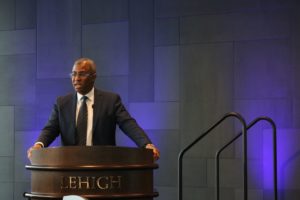
Elliott Harris, Assistant Secretary-General for Economic Development and Chief Economist, United Nations, gives the opening keynote address at the ILO 100th anniversary conference held at Lehigh. Harris stressed growing the technological divide in the world. (Sally Gu/B&W Staff)
9:00 a.m. – Keynote: Elliot Harris, assistant secretary-general for economic development and chief economist, United Nations
Tasked to start a broad conversation and establish a lens through which to view the future of work, Harris began the day with a speech focused on how the magnitude of the force of technological innovation will affect the way the workforce develops. Key technologies, such as smartphones, have become second nature to those who use them and are increasingly changing the baseline for which technology is needed to participate in innovation. With that, he depicted a growing divide between groups across class and income, as well as between nations. While Harris said that restraining technology may not be the solution to the problem, it must be addressed in some way or another.
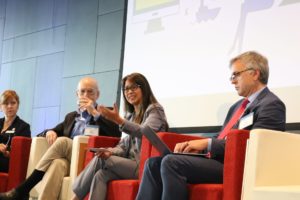
Cheryl Matherly, Vice President and Vice Provost for International Affairs moderates a panel on “lifelong learning” featuring Gary Bolles, Chief, Future of Work, Singularity University; Magnolia Movido, Senior Vice President, GlobalMindED; and Bill Gaudelli, Dean, Lehigh College of Education. The panelists agreed our current higher education model is outdated. (Sally Gu/B&W Staff)
10:15 a.m. – Panel One: Effective Lifelong Learning Systems at Work
- Gary Bolles, chief, Future of Work, Singularity University
- Magnolia Movido, senior vice president, GlobalMindED
- Bill Gaudelli, dean, Lehigh College of Education
The term “lifelong learning” was explored in different ways by a panel which featured Bolles, Movido and Gaudelli. The panelists were in agreement that an educational system in which students collect knowledge at the front-end of their careers and use it for the rest of their lives is outdated. They asserted that in order to prepare people for a career of jobs that may not exist right now, curiosity and intangible skills are the crafts that need to be emphasized.
However, there is also a growing pressure to be an “expert” in a field to remain relevant and avoid an overly general skill set. One possible framework to look at this, Bolles said, is a T-model suggested by IBM that allows individuals to drill deeply into one subject while deploying a number of other interests to have shallow knowledge but intense curiosity in. Movido, a Filipino immigrant with a professional background in tax law, discussed how low-income and first-generation students can fit into the equation through her story as someone who has chosen to give back to those facing similar hurdles.
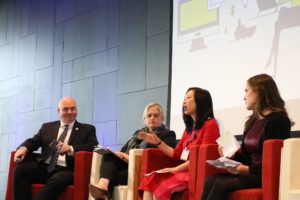
Kevin Cassidy, Director and Representative to the Bretton Woods and Multilateral Organizations, ILO Office for the United States, moderates a panel on equality in the workforce with Jennifer Rosenbaum, U.S. director, Global Labor Justice; Serena Fong, vice president, Strategic Engagement, Catalyst; and Lis Meyers, managing associate, Gender and Social Inclusion, Nathan. The discussion discussed the gender-gap of pay and how to combat it. (Sally Gu/B&W Staff)
11:15 a.m. – Panel Two: Transformative Agenda for Equality at Work
- Jennifer Rosenbaum, U.S. director, Global Labor Justice
- Serena Fong, vice president, Strategic Engagement, Catalyst
- Lis Meyers, managing associate, Gender and Social Inclusion, Nathan
Cassidy, who moderated the session, opened the panel with an assertion on behalf of the International Labor Organization, “Equal work for equal pay tomorrow.”
The group of three women panelists in Rosenbaum, Fong and Meyers discussed the issues that women face in the workforce. Fong cited facts such as a $4,600 gender-based gap between men and women in a study of top business graduates and said she’s tired of arguing the basis of a gender-gap. She, along with the other panelists, said they are much more focused on figuring out how to fix it.
Meyers discussed a full case-study that her organization, Nathan, is doing in Mozambique to figure out how to get women into greater positions of power to reflect their capabilities. The situation only gets more complicated, Rosenbaum said, when you study how global supply chains create situations in which the cheapest labor ends up being the most vulnerable to harassment and gender-based violence.
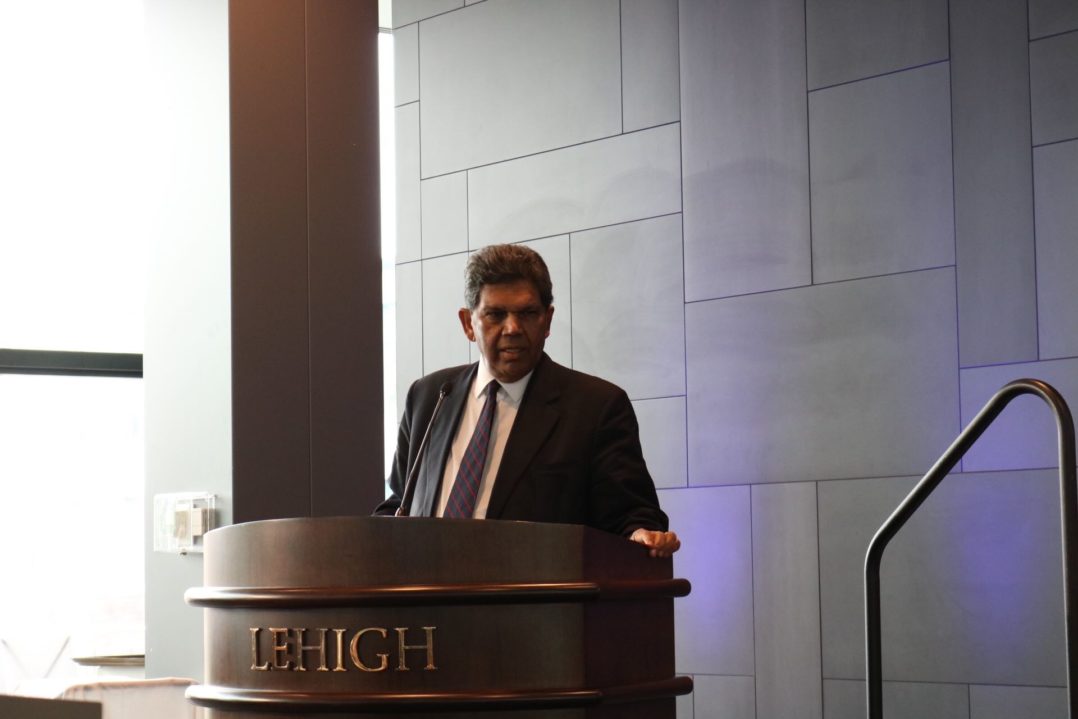
Bertrand Ramcharan, Former Acting High Commissioner for Human Rights, United Nations, delivers a keynote speech during lunch at the ILO’s 100th anniversary conference at Lehigh. Ramcharan shared his experiences in international peacekeeping. (Sally Gu/B&W Staff)
12:30 p.m. – Keynote: Bertrand Ramcharan, former acting high commissioner for human rights, United Nations
Ramcharan’s keynote showcased his experience in international affairs. His time with the U.N. entails a 33-year career in which he served as the high commissioner for human rights and had top-level peacekeeping roles in the former Yugoslavia and Africa. He was chief speech-writer for the secretary-general when he wrote the first draft of the Agenda for Peace.
Ramcharan spoke candidly, without a script, and told stories of negotiations he was part of in both Burundi and Zimbabwe when the countries refused to give recognition to labor unions and in some cases, physically threatened and hurt the workers in such unions. Ramcharan’s main message was that even though the International Labor Organization provides necessary structure to set standards for labor rights, in the real world it can take direct negotiations to make a difference. On the topic of a rights-based approach to decent work, Ramcharan said there is still a long way to go.
1:45 p.m. – The Student Perspective on the Future of Work
In addition to the high-profile speakers of the day, five Lehigh student speakers captured the attention of the audience during their mini-speeches. Each one spoke about what the future of work meant for the their professional aspirations, tying their learnings into themes of the conference. The group’s diversity — in terms of gender, race and field of study — displayed the many ways in which college-aged students can adapt to a changing workforce and increasingly global world.
- Gili Remen, ’19, a double major in journalism and global studies, urged those watching to place an emphasis on digital literacy as a way to combat misinformation and cyber-threats to social media. Coming from Israeli and South African origins, Remen said her goal is to become an international correspondent in the Middle East by promoting constructive dialogue stemming from local newsrooms.
- David Morency, ’18, whose international travels forced him to pre-record his speech for conference-goers to watch, made the case for the importance of China on the global stage. Morency is a Schwarzman scholar who will be studying finance at China’s Tsinghua University and said he is drawn to China because of the massive scale and speed with which the country’s digital economy has developed.
- Maryam Athar Khan, ’19, began her speech with recognition of Katie Bouman, the woman who produced the first ever image of a black hole just a day before the conference. Khan wanted to make a point of highlighting that women in STEM fields face serious barriers and rarely receive credit for their accomplishments.
- Tino Petros, ’20, painted a picture of a problem he’s observed in his home of Zimbabwe, in which high-skilled workers don’t have enough opportunities in the economy to thrive. As a computer science and engineering student, Petros said he strongly believes that the African continent needs less aid and more private investment so that students like him can be incentivized to return home to make an impact.
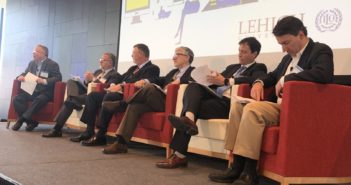
Eric Biel, Gerard Oleksiak, Ben Davis, Carlos Busquets, and Bob Silverman discuss global supply chains on a panel at the ILO’s 100th anniversary conference at Lehigh. The panelists suggested a tripartite means to help improve working conditions around the world. (Musa Jamshed/B&W Staff)
2:30 p.m. – Panel three: Improving Global Value Chains for Decent Work
- Eric Biel, senior adviser, Fair Labor Association
- Gerard Oleksiak, secretary, Department of Labor and Industry, Commonwealth of Pennsylvania
- Ben Davis, director, International Affairs, United Steel Workers
- Carlos Busquets, director, Public Policy, Responsible Business Alliance
- Bob Silverman, managing director, Supply Chain and Logistics, JLL
As moderator, professor of management Robert Trent led off the final panel of the conference by saying that global value chains represent the ‘how’ of many topics of the day. The five men who joined him — whose work ranges from designing supply chain logistics to representing union workers internationally — discussed the problems society must confront given our increasingly outsourced workforce.
Domestically, Oleksiak called attention to the reskilling opportunities that Pennsylvania provides through programs such as apprenticeships. Internationally, Davis called attention to poor labor practices in garment industry strongholds like Bangladesh, although Busquets pointed out that different countries are at different stages of development. The panel reflected the tripartite nature of the International Labor Organization’s intentions, to involve governments, workers and employers in the conversation.




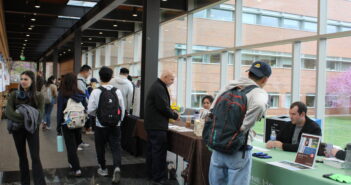
Comment policy
Comments posted to The Brown and White website are reviewed by a moderator before being approved. Incendiary speech or harassing language, including comments targeted at individuals, may be deemed unacceptable and not published. Spam and other soliciting will also be declined.
The Brown and White also reserves the right to not publish entirely anonymous comments.